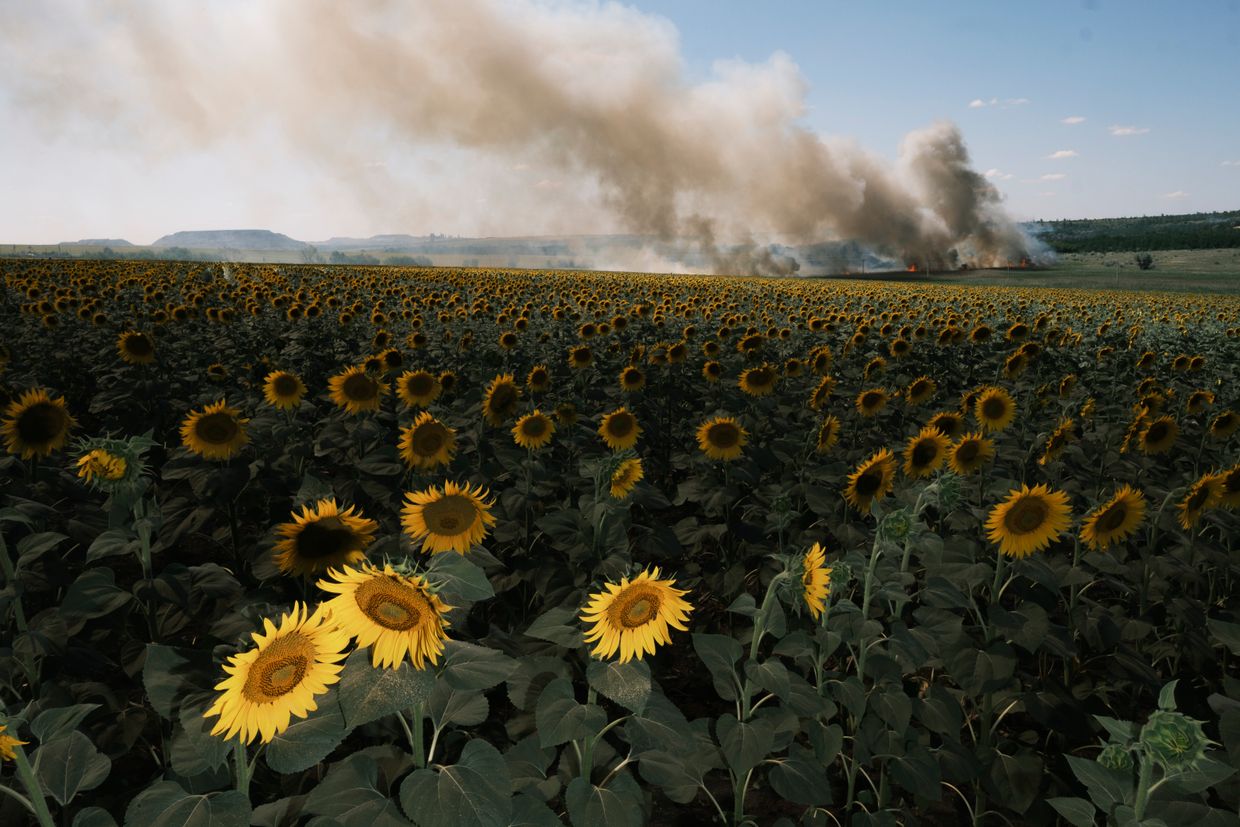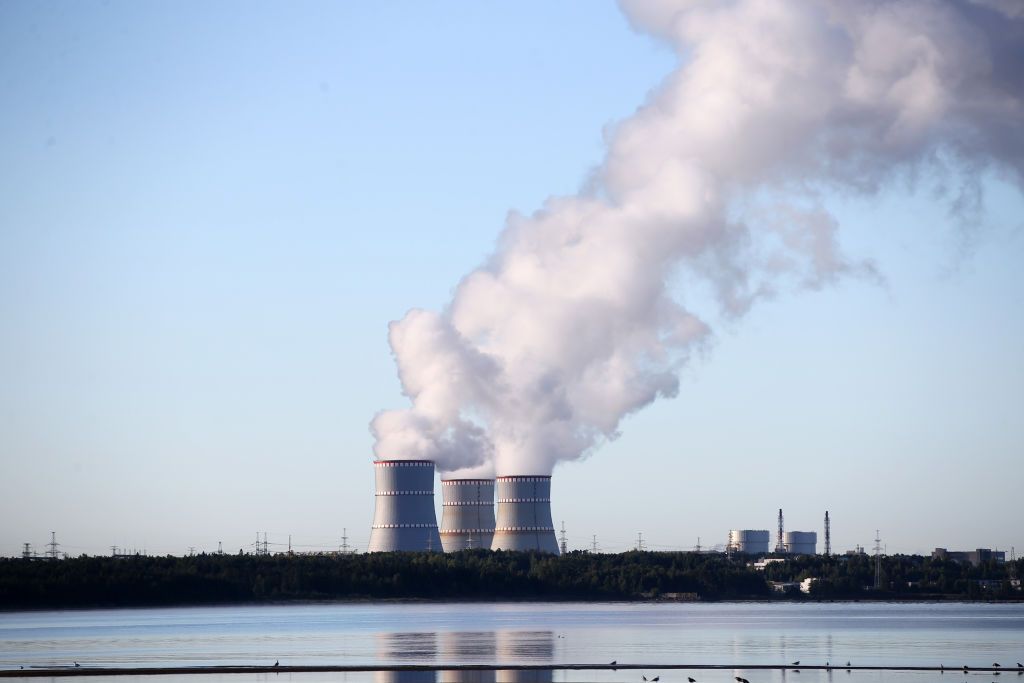Key developments on July 27, 28:
- Russia reportedly captures Vovche, Ukrainian military doesn’t confirm
- Ukraine attacks 3 Russian airfields, bomber damaged, source says
- Ukraine’s military confirms strike on oil refinery in Russia’s Kursk region
- Rebels in Mali claim to have killed and injured dozens of Russian mercenaries
- Fire engulfs Donetsk mine with 86 miners inside, ministry says
Russian forces have captured the village of Vovche in Donetsk Oblast, the crowd-sourced monitoring website DeepState reported on July 27, though the news has yet to be officially confirmed by Ukraine.
Moscow’s troops are attempting to break through Ukrainian defenses in the area, and the sector near Pokrovsk in the western part of Donetsk Oblast has become the hottest part of the front in recent weeks.
Speaking to Liga.net, a Ukrainian news site, on July 26, the commander of the 47th Mechanized Brigade stationed in the area said Vovche had fallen to Russian forces along with the nearby village of Progres.
When asked to confirm if Russia had taken Vovche, a spokesperson for the 47th Mechanized Brigade told the Kyiv Independent on July 27 that “according to DeepState, (it has been) captured.”
A spokesperson for the Khortytsia group of forces did not comment when approached by the Kyiv Independent, but an update from the group on Telegram on the morning of July 27 listed Vovche among several areas where it said Ukrainian forces had stopped Russian assaults.
In his daily address on July 26, President Volodymyr Zelensky spoke about fighting in the Pokrovsk sector, which he described as “the main target of Russian attacks.”
“Everything necessary will be done to strengthen our positions and our capability to inflict significant losses on the occupiers,” he added.
He did not refer to the situation in Vovche.
Commander-in-Chief Oleksandr Syrskyi said earlier this week that Russia continues to push toward Pokrovsk despite suffering heavy losses.
Moscow’s troops are also reportedly attempting to develop an offensive west of the occupied and deserted cities of Avdiivka and Marinka to make their way toward Pokrovsk and Kurakhove.
Land on fire: Russia’s offensive in Donetsk Oblast brings destruction to new towns (Photos)
Since February, Russian forces have steadily advanced across multiple sectors of the front in Donetsk Oblast. They have occupied villages previously liberated by Ukraine, wiped out entire towns, and introduced new threats to the region’s overall defense. Alongside Chasiv Yar, Niu York, and other to…

Ukraine attacks 3 Russian airfields, bomber damaged, source says
Ukraine’s military intelligence agency attacked three airfields deep inside Russia, damaing a Russian supersonic bomber plane, a source in the agency told the Kyiv Independent on July 27.
On the morning of July 27, Ukrainian drones attacked airfields in three regions: Saratov, Murmansk, and Ryazan. The kamikaze drones also hit an oil refinery in Ryazan region.
The attack damaged a Tu-22M3 long-range supersonic bomber-missile carrier in the Olenya airfield, Murmansk region. The airfield lies close to Finland and is roughly 1,800 kilometers from the Ukrainian border.
Ukraine managed to down the Tu-22M3 for the first time in April 2024. The aircraft is armed with AS-4 heavy anti-ship and Kh-22 cruise missiles that are used in strikes Ukraine.
The source did not confirm whether other aircraft were damaged in the attacks and said that the results of the operation are being clarified. However, the Dyagilevo airfield in Ryazan region, which also came under attack, houses Tu-95MS, Tu-22M3, Tu-134UBL, and Il-78 aircraft, in addition to an aircraft repair plant.
With Krynky lost, what did the perilous operation accomplish?
The Ukrainian operation near Krynky in Kherson Oblast appears to be over, as the military said on July 17 that the positions in the village were “completely destroyed.” It follows reports that Ukraine had withdrawn from the village on the Dnipro River’s east bank several weeks earlier. “The Defens…

Ukraine's military confirms strike on oil refinery in Russia's Kursk region
The Security Service of Ukraine (SBU), in cooperation with the Ukrainian military, hit the Polyova oil depot in Russia’s Kursk region overnight on July 28, the General Staff of Ukraine’s Armed Forces confirmed.
Regional authorities in Kursk earlier reported a drone attack that resulted in fires at several locations, including at an oil depot. Three fuel tanks caught fire as a result of the attack, and as of 8 a.m. Moscow time firefighters were still working at the site, according to Alexei Smirnov, the local governor.
“According to intelligence, the enemy’s anti-aircraft defenses were operating in the area. Powerful explosions and fire followed, probably involving containers with oil products,” the General Staff wrote on social media.
The Polyova oil depot consists of 11 oil storage tanks with a total volume of 7,000 cubic meters and is reportedly used to supply the Russian Armed Forces.
Opinion: Russia’s nuclear giant is falling through the sanctions cracks
Even as the 38th anniversary of the Chornobyl nuclear disaster has come and gone, the nuclear threat posed by Moscow continues to grow. Rosatom, the Russian state nuclear energy company, has a hand in this – namely, by financing Russia’s war against Ukraine, fostering global energy dependencies that…

3 Russian helicopters damaged in Ukrainian sabotage operations, source says
Three Russian helicopters were damaged over the past week as a result of sabotage operations coordinated by Ukraine’s military intelligence agency (HUR), a source in the agency told the Kyiv Independent on July 27.
The operation damaged a Mi-28 and a Ka-226 helicopter in the early hours of July 21. Explosions erupted at the enterprise, which develops, produces, and repairs helicopters.
Another operation destroyed a Mi-8 helicopter on July 24 at the Kryazh military airfield in the Samara region, roughly 800 kilometers from the Ukrainian border. The source did not provide further details about the attack.
Russia has lost 326 helicopters since the start of the full-scale invasion, according to the latest report from the General Staff of Ukraine’s Armed Forces.
Rebels in Mali claim to have killed and injured dozens of soldiers, Russian mercenaries
Mali’s army and Russian mercenaries from the Wagner Group lost dozens in killed and wounded in a battle with rebels in the country’s north, a spokesman for the rebels claimed on July 27.
Russia maintains a strong presence in African countries through Wagner and other entities, propping up authoritarian governments, fueling destabilization, and extracting resources to fund its war against Ukraine.
The West African nation of Mali has been the subject of a significant Russian influence campaign since the Malian army overthrew the government in a coup in 2021. The Wagner mercenary group, founded by the late Yevgeny Prigozhin, has been particularly active in Mali and has been accused of perpetrating war crimes and widespread looting.
Mohamed Elmaouloud Ramadane, spokesman for the pro-independence CSP-DPA coalition, said in a statement published on Facebook that a two-day battle on the outskirts of Tinzaouaten village earlier this week resulted in the rebels destroying “the entire column of the Malian army and Russian mercenaries.”
Ramadane added that “the enemy suffered huge losses in terms of lives and equipment, including dozens of dead and wounded.”
An unnamed local politician told AFP that the Malian army had retreated from Tinzaouaten as a result of the battle.
The Malian government forces reported on July 28, as cited by Associated Press, that two of their soldiers had been killed and 10 injured in a rebel attack.
Opinion: A Russian victory in Ukraine would be bad for Africans
Nineteen-thirty-eight is an apposite metaphor for 2024, of a world poised on the brink of a devastating war. The pieces are all there: Russia’s invasion of Ukraine, tensions across the Taiwan Strait, the U.S. increasingly divided and isolated, the Middle East divided along sectarian and tribal lines…

Russian pro-war Telegram channels, including those linked to the Wagner Group, published photos and videos allegedly showing the bodies of killed mercenaries and destroyed equipment.
They also wrote that among the killed Russian mercenaries was the author of Grey Zone, a major Telegram channel covering Wagner actions in Ukraine and Africa, and Anton Elizarov, a Wagner commander who led the group’s offensive operations in Ukraine’s Soledar and Bakhmut.
None of these claims can be independently verified.
Wagner mercenaries fought in Ukraine and launched a brief rebellion against the Kremlin in June 2023, marching on Moscow before abruptly ending their mutiny. After the failed rebellion, some Wagner members signed contracts with the Russian Defense Ministry, others went to fight in Africa.
Wagner boss Prigozhin is dead. Here’s what it means for Africa
Just two days before a plane carrying Wagner boss Yevgeny Prigozhin along with other top commanders of the Kremlin-linked mercenary group crashed over Russia, a video appeared online in which Prigozhin claimed to be somewhere on the African continent. In the video, published by the Russian “Razgruz…

Fire engulfs Donetsk mine with 86 miners inside due to Russian shelling, ministry says
Russian shelling in Donetsk Oblast set fire to a mine with 86 miners inside, the Energy Ministry reported on July 27.
As flames engulfed the pit, 84 workers were taken out while two remained inside to ensure the operation of the mine. The ministry did not report any casualties after the fire was extinguished.
Russian forces also targeted the electricity infrastructure in Chernihiv and Dnipropetrovsk oblasts over the past day. The strikes in Chernihiv Oblast left 2,946 households without power, while energy workers restored power to 8,359 households across Ukraine. As of the morning of July 27, 485 settlements were disconnected from the electricity grid.
Russia continues to bombard Ukraine’s energy infrastructure, particularly in front-line and border regions. The Energy Ministry says that 9 gigawatts (GW) of energy capacity has been lost, which is half of the power used last winter.
Ukraine has suffered scheduled blackouts since mid-May following several devastating attacks on energy facilities. Under the worst-case scenario, Ukrainians could face 20-hour blackouts in the upcoming winter, according to Dmytro Sakharuk, the executive director of Ukraine’s largest privately-owned energy company DTEK.
Power outages have also impacted Ukraine’s miners, that continue to work in front-line regions despite the harsh conditions. In March, DTEK said 1,060 miners were temporarily trapped in the company’s mines in Dnipropetrovsk Oblast after a Russian attack caused power outages. All miners managed to escape.

